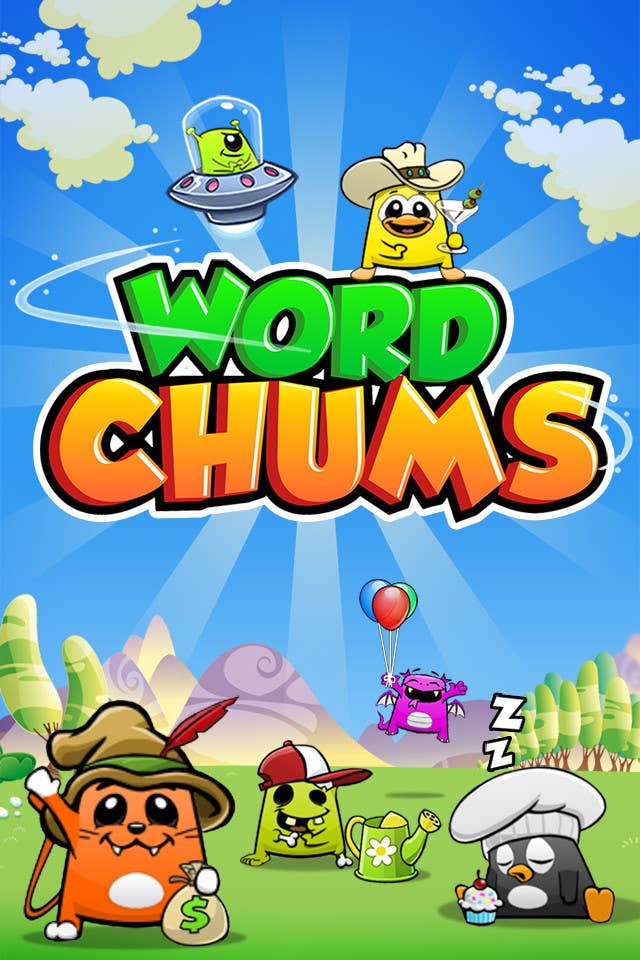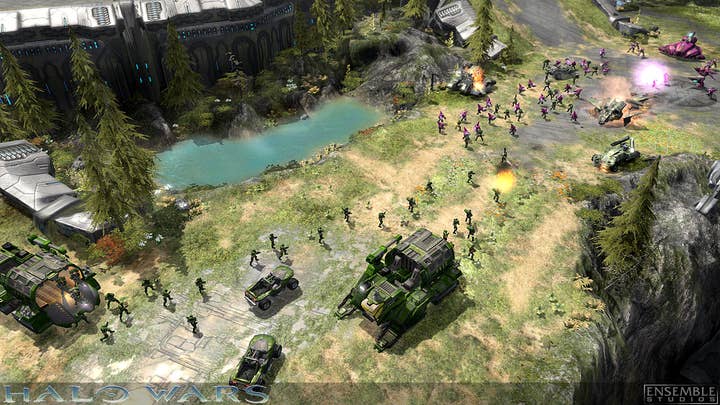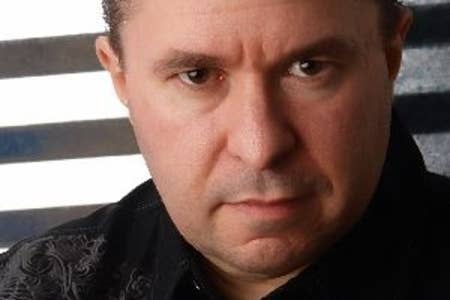Tony Goodman: "The publisher as we know it may become extinct"
Ensemble Studios founder talks about his new project and how an open platform may eat Microsoft and Sony's lunch
At the start of 2009, Microsoft officially shuttered Age of Empires and Halo Wars developer Ensemble Studios. The business decision meant that industry veteran Tony Goodman and plenty of other top talent suddenly faced the reality of being jobless. Many went on to form startups, and Goodman in particular continues in the entrepreneurial spirit with a new mobile/social firm called PeopleFun, which just released its first game, Word Chums, on iOS last week.
The game will directly challenge word-based juggernaut Words With Friends from Zynga, but Goodman isn't worried about taking on a social giant. In fact, he couldn't be happier to be in the position he's in now, working with a smaller team and not answering to a higher authority, as he had to do with Microsoft for years.
Goodman, like many developers making the move from consoles to mobile/social, is relishing the opportunity to work on games the way he wants to. In this in-depth interview, GamesIndustry International chats with Goodman about the transition to mobile, why so much talent is migrating, how publishers will have to evolve, how consoles may be seriously challenged by an open platform, and what it was like working on Halo Wars while facing imminent studio closure.
"The same type of fun that exists in epic games like Age of Empires and RPGs is fundamentally the same type of fun that exists in smaller games"
Tony Goodman
When Microsoft closed down Ensemble a lot of the team started Robot, which is another big company. Even at that time I was feeling like I wanted to do something in a real focused team, rather than manage a large team just because I'd had such great experiences and most of the things we'd gotten done at Ensemble, all the really hard work, that happened in a small team. So I really wanted to try a company out that was just made of the small type of people. When we had the opportunity to start Robot, we did that and we [physically] had all the Ensemble people available. But after that got established, I formed PeopleFun. I still own a lot of Robot and I'm on the board of directors but I'm not involved day to day.
The idea with PeopleFun was to form a team with some of the people we started Ensemble Studios with, so it's a team I have a lot of experience with. We want to do great stuff; it's not necessarily epic anymore because it does exist on a mobile phone and the experiences on the mobile device aren't typically multi-hour experiences.
The same type of fun that exists in epic games like Age of Empires and RPGs is fundamentally the same type of fun that exists in smaller games - the type of decisions that are made, the way the human brain works. We feel that we're in a good space to be able to offer awesome gameplay. Also, as we get older and our time commitment gets spread in several different ways, in order to make games that we're continually passionate about, we need to make games that we're playing. And as we get older, we're playing less multi-hour experience games and we're playing a lot more of our favorite games on mobile. So that presently interests us.
I would say it was easier to learn it the first time. We didn't know what we were doing when we started Ensemble Studios and we got into RTS gaming. I guess it was a little easier because we didn't have anything to unlearn at that point. We were just naïve about everything. So I think we came into it expecting that our 15 years or so of experience was going to make this a breeze for us, and I think we made all the mistakes that everyone talks about that you shouldn't make. It took us too long to make the game. We like to make it perfect, so we iterated like it was a AAA quality game. And I think for us that was a real learning experience. We definitely made all the mistakes that people said we shouldn't make. We thought we'd be immune from them.
I'm seeing other companies have difficulty with this transition. Yet, I think the thing that's common is the companies that have really good quality management, really good quality programmers and artists, eventually they'll come out of this as the best game makers on the mobile space. It takes them a while to learn the new platform. But I still think the common thing is that high quality people will do a high quality job wherever they are. It's just harder for people who think they're experts to learn something new. I read a bit of a book called Zen Beginner's Mind, which really talks about how people who know nothing are the best learners, and people who are experts learn the slowest.
"I think the console is the one that's the most stagnant by far. There's just very little way for that industry to change when it's locked up by the manufacturer"
Tony Goodman
I think part of it is just the low cost of entry because in the mobile space you can start a team with just two or three people. And that's just not viable in the console and PC space to really put out a great title. Certainly on the consoles, it's just about impossible to do anything for less than $10 million per title these days. That's part of it. That's certainly what seems to attract a lot of people. In the end, you'll see some of that wash out. Some of that is just attractive for people who think it's an opportunity to start their own business. But I do think there's an element of creativity that's also allowed with the smaller teams that just isn't provided for in a larger team.
At Ensemble, we had a very low turnover rate, so the people who were the lead developers, programmers, artists, designers kept their jobs for a long period of time. There wasn't a lot of turnover, so there also wasn't a lot of advancement. So if you really wanted to be the lead designer, it was very difficult. At the best companies where there is low turnover, that also means there are very few positions opening up. So for people with ideas, the mobile space is great. And part of the migration of talent is there are much more interesting jobs for people wanting to try their own thing.
Also, leaving the traditional publisher out of it, it's been great for the industry. Even with Steam and mobile, both have caused a flurry of creative activity that's great for gaming. So I think the console is the one that's the most stagnant by far. There's just very little way for that industry to change when it's locked up by the manufacturer. PC games have a pretty interesting future still. Console games will probably stick around, but you won't see as much change in the console game market. As long as the Call of Duties and the Maddens are out there and selling well, those will make up the majority of sales. And the creativity you'll see will be on Steam and mobile.
"I think Microsoft and Sony are seeing what we're talking about and are going to try to react to it, but it could be that an open console platform ends up eating their lunch"
Tony Goodman
We did see for a while Xbox Live and that type of thing helped creativity, but those didn't really affect the premium titles for consoles, right? I think Microsoft and Sony are seeing what we're talking about and are going to try to react to it, but it could be that an open console platform ends up eating their lunch.
I think something will. I don't know if it's that or another thing, but something has to come around that will disrupt it. I don't have enough of a sense for the market to know if it's that thing or another, but it's certainly a possibility. The amount of creativity that can be pumped into an open platform will be very difficult for closed platforms to compete with. It always is.
The answer is yes and no. The publisher as we know it may become extinct, but the publisher won't become extinct. It's just going to change forms. There will always be an advantage for large organizations who have a kind of monopoly on content. Right now we see it in mobile in terms of distribution power and cross-promotional ads; Zynga can maintain their spot in the market with all their own games just because of the raw horsepower they have. That may be the future model for publishers, and certainly it's a very different type of publishing model. It's not clear what that publisher will look like, but I don't think publishers will disappear. They've changed forms and in the process of changing forms, some of the top publishers may not be around anymore unless they move faster. Certainly, it's hard to think of Microsoft going away - I'm not saying they would, but we saw Steam eat their lunch in terms of digital distribution. Little Valve came along and stole this market away from the largest company in the world.
"The publisher as we know it may become extinct, but the publisher won't become extinct"
Tony Goodman

We believe we have a chance to take share away from them. We don't think it'll happen overnight, but it'll be a little less time because we can move faster than Zynga. Word Chums won't be our only product. I think over a period of time, we plan on chipping away at that and strengthening our offering. Our strategy is to build a set of products around these characters called Chums, which are like a set of Nintendo characters. We're trying to build value into the characters themselves, so each time we put out a game, people will be more interested because they liked the last one, or the characters from the last one. It's just like you would play any Mario game that comes out because it's Mario and you already have a lot invested in that brand. Our idea is to compete with the IP and characters rather than compete on a game-by-game basis. Looking at With Words with Friends, we think have a lot we can offer and a lot of staying power.
Right now what we're working on is our game metrics, and our virality, making sure the game is just how we want it to be before we go into huge advertising expenditures. But our response has been fantastic. We had a five-star rating out there, and people really like it. We've stopped doing advertising for this week because we're trying to check how much our audience grows with absolutely no advertising. And we're seeing significant growth in our base right now with nothing supporting it, which is the best kind possible.
"In the long term, I don't believe in the doom and gloom predictions for Zynga. They have some really good people"
Tony Goodman
I think they'll continue to do very well. What we saw was kind of a little burst of a bubble that happened, that they were responsible for. Yet, at their core, they have a lot of good ideas. I don't think they'll be the only game in town anymore, but I don't think their stock will sit at $3. I think it'll go up some from here, and I do believe they have a process that's very solid. In the long term, I don't believe in the doom and gloom predictions for Zynga. They have some really good people. But the exodus we saw made sense in the fact that a lot of people were sticking around for the stock and if that shows no promise, then they leave. I don't know how long it's going to take them to recover. I think they were ambitious shooting for an IPO at the time they did.
Certainly there's culpability on Ensemble's side. If we had been making even more money for Microsoft, it would have been harder for them to close us down. But their position was they could try to internalize that development, and we were pretty expensive. It's hard to manage guys who were in a different city making a game they could do on their own. I was pretty surprised by it, and I think there were some internal things going on that made them want to bring the headcount to Redmond. There were political factors involved. But there certainly was a benefit for Dallas and the free market because when Ensemble broke up, so many different companies got started. It's not something I would have asked for, but after it's happened, given a few years, I'm glad it did.
Well I think they made a boneheaded decision, but I'm glad they did. It was an opportunity for Bonfire to get started... It was an opportunity for Robot and many other companies that are doing really well right now. At Robot, we started creating games that we never would have been able to create under Microsoft. So it was a real opportunity for everybody. I think if I were a member of the Microsoft management team, I'd be scratching my head and wondering why we did that.

That's exactly correct. We wanted to reinvent the RTS in the console space, or kind of invent it in the first place because there hadn't been any good ones. And we made a lot of progress on that project. At the time, the lead designer was Graeme Devine, and I think it was Peter Moore who was the head of Microsoft [Xbox] before Don Mattrick. But Microsoft was pretty risk averse and they said, "I don't know if we want to take the risk of creating strategy games on a console. We'd feel better if Halo were attached to it." The difficult part of that was it took the game back about a year in development, and I think it never quite turned out the same. They just said, "Why don't you just paint over what you have with Halo stuff?" But things aren't quite that simple.
And another problem was that Bungie was never up for it. So we started with Halo Wars, which I think turned out to be a really fantastic, under-recognized product. But Bungie was kind of sore about the idea. What they called it was "the whoring out of our franchise" or something. Yeah, that didn't create a great relationship between us and Bungie; they viewed us as someone infringing [on their franchise]. So those are some of the dangers of working with a publisher. It's certainly easy to understand the publisher's point of view. "Looks like you're doing a great game, but wouldn't it be greater if it had Master Chief attached?"

